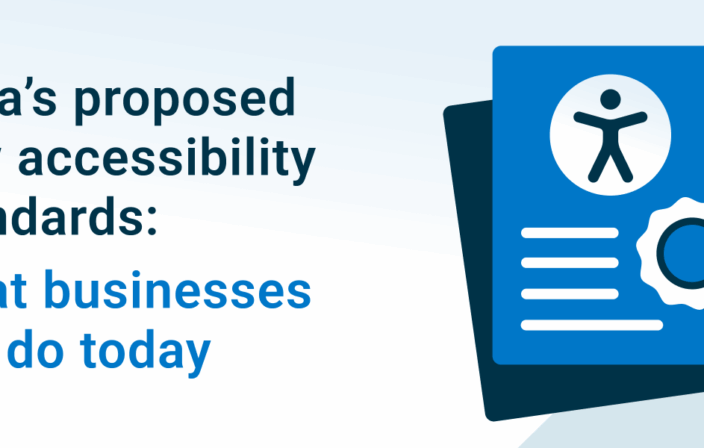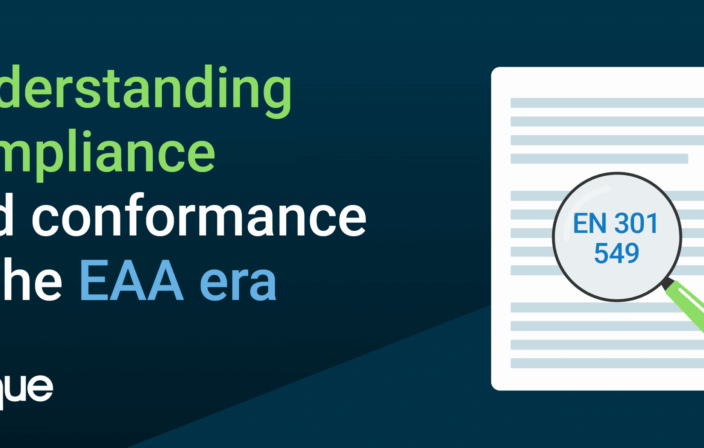A comprehensive guide to understanding digital accessibility requirements in Canada
Digital accessibility is an integral aspect of equality and inclusivity, providing the same opportunity for all in the modern, digital world. In recognition of this, Canadian federal and provincial governments have implemented various legislative acts to ensure that individuals with disabilities have digital access without barriers.
Let’s explore four legislative acts that cover different digital accessibility requirements for businesses that operate in Canada and particular provinces and territories: Accessible Canada Act (ACA), Accessibility for Ontarians with Disabilities Act (AODA), Accessibility for Manitobans Act (AMA), and Accessible British Columbia Act (ABCA). We will review core standards, compliance requirements, deadlines, and the impact these laws have on creating inclusive digital experiences in Canada.
Accessible Canada Act (ACA)
The Accessible Canada Act came into effect in 2019 and aims to promote accessibility and remove barriers faced by persons with disabilities by identifying and removing barriers in the following areas: employment, built environment, information and communication technologies (ICT), communications beyond ICT, procurement of goods & services, design and delivery of programs and services, and transportation.This federal legislation applies to various sectors, including federal government organizations and federally regulated businesses ( banking, telecommunications, transportation, and broadcasting).
Areas of focus for this act:
- Digital Accessibility: The Act emphasizes the importance of ensuring digital content, including websites, mobile applications, and multimedia, is accessible to all users.
- Accessibility Plans: Organizations must develop and publish accessibility plans outlining their strategies to identify, prevent, and remove barriers within specified timeframes.
- Accessibility Feedback Process: Organizations must provide an accessible way to receive feedback about their accessibility plan and/or accessibility barriers from people with disabilities. Organizations are required to report on accessibility feedback received as well as progress in addressing barriers reported via this feedback process.
- Accessible Formats: Organizations must provide accessible formats of information upon request, such as Braille, large print, or accessible electronic formats.
- Employment Accessibility: Employers must implement measures to provide equal employment opportunities and accommodation for persons with disabilities.
Important applicability, deadlines, and requirements:
| Law Parameters/Law | Accessible Canada Act (ACA) |
|---|---|
| # of Canadian-based employees | 10 or more employees |
| Type of Business | Government entities, armed forces, police, parliaments, and federally regulated businesses (including banking, telecommunications, transportation, and broadcasting) |
| Deadlines and Reporting Requirements | Accessibility Plan due:
|
Accessibility for Ontarians with Disabilities Act (AODA)
The Accessibility for Ontarians with Disabilities Act is a law established by the government of Ontario in Canada to develop and enforce accessibility standards for government, businesses, nonprofits, private and public sector organizations. The goal is to create a fully accessible Ontario by 2025. The AODA includes specific requirements that define whether or not something is accessible and deadlines for meeting and reporting on compliance. It places significant emphasis on process-oriented requirements. For example, all organizations regardless of size are obligated to train their teams on accessibility and the legal responsibilities employees have towards providing accessible digital experiences. There also must be a way for people with disabilities to give feedback or ask for help. Employment practices must be accessible and all organizations with more than 20 employees must formally report on their accessibility progress to the Ontario government.
Areas of focus for this act:
- Web Content Accessibility Guidelines (WCAG): Organizations must follow WCAG 2.0 Level AA standards to ensure their websites and digital content are accessible.
- Accessible Formats: Organizations must provide accessible formats of information upon request, such as Braille, large print, or accessible electronic formats.
- Training: Employers are required to provide accessibility training to employees, equipping them with the knowledge to create and maintain accessible digital content.
Important applicability, deadlines, and requirements:
| Law Parameters/Law | Accessibility for Ontarians with Disabilities Act (AODA) |
|---|---|
| # of Canadian-based employees | 1+ employee(s) in province, additional requirements for 20-49 and 50+ |
| Type of Business | All government entities, businesses, and nonprofits |
| Deadlines and Reporting Requirements | Accessibility Progress report due:
|
Accessibility for Manitobans Acts (AMA)
The Accessibility for Manitobans Act became law in December 2013. AMA legislation was enacted to prevent and remove barriers for people with disabilities and other Canadian citizens. AMA impacts all Manitobans. People with disabilities who navigate barriers every day and those in a position to identify, remove, and prevent barriers to accessibility. In order to develop better accessibility standards, the Manitoba government works with representatives in the disability community, as well as public and private sectors. AMA recognizes that accessibility standards are building blocks for making real, measurable, and effective changes to accessibility. Each standard included in the AMA outlines specific requirements and timelines for organizations that have a responsibility for compliance.
Areas of focus for this act:
- Accessibility Training: AMA mandates specific training requirements which include how to identify, prevent and remove accessibility barriers for information and communication. This applies to employees who communicate directly with the public, maintain or develop an organization’s web content, purchase or procure ICTs, and develop or implement accessibility measures, policies and practices.
- Accessible Websites: Organizations must ensure their websites meet WCAG 2.1 Level AA standards, allowing individuals with disabilities to navigate and access content seamlessly.
- Accessibility Feedback and Reports: The Act requires organizations to establish feedback processes and produce accessibility reports to monitor compliance progress. Organizations must be able to provide a customer service accessibility policy and an ICT accessibility policy upon customer request.
Important applicability, deadlines, and requirements:
| Law Parameters/Law | Accessibility for Manitobans Act (AMA) |
|---|---|
| # of Canadian-based employees | 1 or more employee(s) in province |
| Type of Business | All government entities, businesses, and nonprofits |
| Deadlines and Reporting Requirements | Compliance Deadline for meeting WCAG 2.1 A/AA
|
Accessible British Columbia Act (ABCA)
The Accessible British Columbia Act, enacted June 2021 with further developments slated for 2024, is legislation developed to provide people with disabilities meaningful participation in their communities through work, play, and other daily activities. This act aims to make British Columbia a truly inclusive province for all people, remove barriers that prevent equal access and participation, and become the most accessible province. There are a few priority initiatives within this act that will span 10 years of implementation: culture change, requirements for the British Columbia government, monitoring and evaluation, standards development and accessibility regulation.
Areas of focus for this act:
- Accessible Websites and Web Content: Organizations must comply with WCAG 2.1 Level AA standards for their websites and digital content, ensuring equal access to information and services.
- Accessibility Planning: ABCA requires organizations to develop a plan to be more accessible. This must be done in collaboration with people with disabilities.
- Accessibility Compliance: Organizations must bring ICT and other areas like employment, communication and the built environment into compliance with the ABCA and the WCAG standards listed above.
- Accessibility Feedback: The ABCA requires organizations to establish feedback processes and provide customer service to respond to customer feedback and requests.
Important applicability, deadlines and requirements:
| Law Parameters/Law | Accessible British Columbia Act (ABCA) |
|---|---|
| # of Canadian-based employees | Currently N/A |
| Type of Business | Currently applies to government entities, expected to expand into private/nonprofit sector |
| Deadlines and Reporting Requirements | Accessibility plan updates required every 3 years |
Getting your organization prepared to meet compliance requirements
As a business operating in Canada, nearly all types of organizations are subject to at least one of the digital accessibility laws listed above. It is the responsibility of the organization to meet and report on compliance requirements for digital accessibility, as well as developing accessibility focused feedback channels for customers and employees. Continuously preparing, publishing and implementing accessibility plans is fundamental to maintaining compliance.
How Deque can help
Deque is the world leader in digital accessibility. With over 20 years of experience, we’ve perfected the art of performing efficient and trusted accessibility audits. Partner with us to:
- Prepare, publish, and implement a comprehensive accessibility plan
- Including accessible feedback processes, procurement, customer service training, and more.
- Continuously report on accessibility plan progress.
- Avoid having to assemble your own internal team.
- Minimize disruption while meeting and maintaining compliance.
- Create and set a path toward a sustainable and efficient digital accessibility future.




